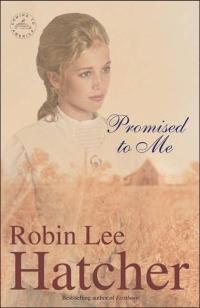 HOW FREAKING ROMANTIC |
 Fall headfirst into July’s hottest stories—danger, desire, and happily-ever-afters await. |

Purchase
Coming to America Book Series #4 Inspirational Romance Excerpt of Promised to Me? by Robin Lee HatcherPrologue April 1897 It was good that God made Jakob Hirsch the son of a farmer, for he could never have been a sailor. Seasickness had plagued him from the beginning of this voyage. But at the moment he wasn’t feeling so bad. The steamship was making its way into New York harbor. Today he would feel the good, solid land of America beneath his feet. Laughter reached his ears, and he glanced across the deck toward three young women standing near the ship’s railing. The unlikely group of friends—as different from one another in appearance as night is from day—had first captured his attention soon after the RMS Teutonic left Southampton, England. Something about their nervous excitement, their sense of adventure, their unspoken hopes and dreams for the future—obvious to anyone who looked at them—defined this trip for Jakob. The English girl, an elegantly dressed, auburn-haired lady of means, was pretty and shapely. The blonde from Sweden was plain, unusually tall, and much too thin for Jakob’s taste. The Irish girl with the wild mane of black hair—the one with the wedding ring and slightly rounded belly—had an earthy beauty and a spark in her eyes that must spell trouble for her husband, poor fellow. Not that Jakob had met the woman or her friends. Nor did he want to make their acquaintance. Jakob had a girl of his own back in Germany. Still, watching those three young women had helped dispel some of the boredom of the shipboard journey. A gust of wind caught Jakob’s cap and nearly swept it away. Just as he caught it, he heard someone exclaim, “There it is!” He surged to his feet and rushed to join the others at the rail as the Statue of Liberty came into view. He’d made it. He was here. America! Here he would make his way, buy his own land, have a freedom and a hope that a poor farmer, the youngest of five sons, couldn’t have in his homeland. Here he would find his future. “Amerika,” he whispered. “I have made it, Karola, mein Liebling. Soon you will come, too. I promise.” Chapter One Ellis Island, May 1908 “Miss Breit?” The inspector looked at her, bored indifference in his gaze. “Are you traveling alone?” "Ja,” Karola replied. “And who will be meeting you?” This time, Karola answered in English. “I will not be met. I am going by train to Idaho. I am to be married when I arrive there to Mr. Jakob Hirsch. He is a farmer.” “Do you have proof of those arrangements?” “Ja.” She removed Jakob’s telegram and the train fare—in American dollars—from her satchel, just as she’d been told she would have to do. The inspector looked at them, grunted, then marked something on a paper and sent her to the next line. Helga Wehler was already there. Like Karola, Helga was traveling alone, coming to America to be married. Unlike Karola, Helga was only seventeen and afraid of her own shadow. The girl had attached herself to Karola soon after they’d met in the crowded women’s quarters below deck. Helga turned around, her eyes wide. “Are you afraid, Fräulein Breit?” Helga was referring to the next inspection, one every immigrant dreaded above all others. Using a buttonhook, a doctor turned up both eyelids, looking for trachoma. If the disease of the eye was detected, the immigrant would be detained on Ellis Island, then sent back to Europe on the next available ship. “Nein,” Karola answered. How could she be afraid now that she was finally in America, now that she was finally about to be married to Jakob Hirsch? Eleven years. Eleven years since she’d promised to marry Jakob. Eleven long years of waiting and wondering and doubting and despairing. She had lost hope, of course, with the passing of time, but now she was here. She was to be Jakob’s wife at last. After leaving for America, Jakob had written to Karola regularly until the spring of 1901. Then the letters had stopped. Never a reply, no matter how often she’d written to him. By the end of the following year, believing that something terrible must have happened to him—he had to be dead—she’d stopped waiting to hear from him. Only pride had kept her from allowing others to see her broken heart and shattered dreams. Then, last December, a letter had arrived from America. A letter from Jakob. She remembered standing in the parlor of her parent’s home above her father’s bakery, holding that letter, her heart racing, her emotions swinging wildly between hope and bitterness, anger and joy, love and hate. He owned a farm in a place called Idaho, Jakob had written. The soil was rich, and there was a fine house and outbuildings. If she was unmarried, would she consider coming to America to be his wife? As she’d read his letter, she’d pictured herself, seated with her parents in their small church each Sunday or working with her father in the bakery every day. She’d felt the pitying stares of the young married women of her village. Poor Karola. No one wants her now. Others, she’d known, laughed behind her back. Serves her right for thinking she’s better than everyone else. Going to America. Ha! Oh, she’d known what they whispered when she was out of hearing. In those first years after Jakob left, she had bragged to everyone about how rich they were going to be in America, about how much Jakob loved her, about how perfect their new lives would be once they were together again. When other men had tried to court her, she’d rejected them, firmly and plainly—even at times, she supposed, cruelly. Then Jakob’s letters had stopped arriving, and by the time she’d stopped hoping, most of the suitable young men of Steigerhausen had either married or moved away. The few who remained wanted nothing to do with the baker’s daughter. Who wanted a wife with a head full of impossible dreams and a heart that still longed to see the world beyond the borders of their small village? No one, it had seemed. Not until Helmutt Schmidt. The very idea of being married to him made her shudder. And so, as Karola had read Jakob’s letter, asking if she would come to America, she had made a quick decision: Ja, she would. She would do anything to get away from the life she’d been leading. Anything. The first steps of her journey had begun four months later . . . Chapter Two American Falls, next stop," the conductor announced from the rear of the coach. Karola looked out the window, wondering when the station would come into view. After several days of train travel, she was weary, dusty, and rumpled-not unlike when she'd arrived in America on the steamship the week before-but this time her arrival meant the end of her journey. In a short while, she would see Jakob. By tomorrow, she would be Mrs. Jakob Hirsch, and she would live in a fine house and have all the things she'd wanted. No one would ever again have the right to whisper and titter about her. She tried to picture Jakob but failed. She remembered thinking him the most handsome of all the young men in Steigerhausen. She'd known the other girls in their village had been green with jealousy because he'd chosen her. If she concentrated, she could almost hear his laughter, a sound that she remembered had risen from deep in his chest. Was he still as handsome? Did he have that same laugh? What was he like now? Would she recognize him when she saw him? And, the most persistent questions of all: Why had he stopped writing to her? And why, after so many years, had he written to her again? Her mother had told her to ask him those things and more before she accepted his offer, but Karola hadn't listened. She'd wanted out, and Jakob's letter had provided the way. As far as she could tell, there was no good reason to refuse his proposal of marriage. Jakob had always adored her. He wouldn't have sent for her if he didn't adore her still. Whatever the cause for his long silence, it was in the past now. He would love her, she would for-give him for abandoning her, and all would be well. "Miss Breit?" Karola gave a start, pulled from her thoughts. "We're almost there," her elderly seatmate, Mrs. Rankin, said. "You must be excited to see your fiancé." Excited? She supposed so. Or was it trepidation that caused Karola's pulse to race? "My goodness," Mrs. Rankin continued, "I can only imagine how overwhelming this must all seem to you. Did I tell you I came west over the Oregon Trail when I was a bride of twenty?" Ja, she had. The woman had rarely stopped talking since she'd boarded the train in Chicago and taken the seat beside Karola. "My, what a wilderness it was back then. The wide-open prairies and the Indians and the forests and the rivers. No trains, you know. Not like it is today. It was wild, I tell you. The Wild West, just like that Buffalo Bill's show called it. Well, maybe not exactly the same, but near enough." Karola looked out the window. What would she do if she saw a wild Indian? "Perhaps I mentioned this already, but my niece lived in Shadow Creek for a time. She said it was a nice town, although much too small for her liking. Quite the little organizer, that girl. All involved in the suffrage movement." Karola turned to the older woman, unable to translate the word suffrage from English to German. Mrs. Rankin seemed to understand the question in her eyes. "Suffrage. A woman's right to vote. That's why my niece moved to Oregon. Idaho women have had the right to vote for quite a spell, but Oregon hasn't seen the light yet." She laughed. "Land sake, I can see that's buffaloed you. Young woman, the West is chock-full of opportunities if you aren't afraid to try." The train began to slow, drawing Karola's gaze once more to the window. Her heart pounded hard as she wiped the palms of her hands against her skirt. This was it. The time had come. Her journey was about over. Amid hisses and creaks-sounds she had heard countless times as she crossed America-the train rolled to a stop. "American Falls," the conductor called. Karola stood and reached for her two battered suitcases. "I've enjoyed talking with you, my dear," Mrs. Rankin said. "I wish you and your intended every happiness." "Danke," Karola replied. Then with a suitcase clutched in each hand and her satchel pressed against her ribs beneath her right arm, she made her way toward the exit. She paused before stepping from the train, scanning the platform. And there he was. She would have recognized him even if he hadn't been the only person waiting for passengers to disembark. He was, indeed, as handsome as ever. Not that he hadn't changed. He had. Copyright 2003 Robin Lee Hatcher Excerpt from Promised to Me? by Robin Lee Hatcher |
|
| |||
|
||||



 © 2003-2025
© 2003-2025